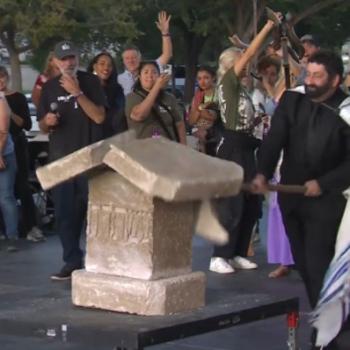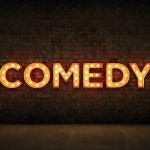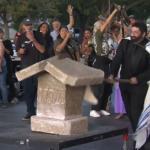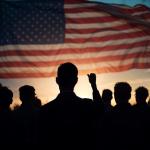Stumbled across a photocopy of the following from back when I worked in the archives of the American Baptist Foreign Mission Society.
This is an account from the diary of Nathaniel Brown, a former Baptist missionary who returned home to serve as editor of “The American Baptist and Freeman,” an abolitionist newspaper. On New Year’s Eve, 1862, Brown and two other Baptist clergymen met with President Abraham Lincoln to present their “memorial,” or declaration, about the content and the intent of the Emancipation Proclamation, which was issued the following day.
It's a fascinating glimpse of history — the accessibilty and informality of the White House, the behind-the-scenes look at Lincoln, the idealistic zeal of the abolitionists. I particularly enjoyed seeing the contrast between the clergymen's earnest certainty and the president's irony and his sense of responsibility for consequences. Reading this, I can't help but think that they don't make presidents — or political preachers — like they used to.
To borrow a phrase from the Rev. Brown, the "length is formidable," so the full diary entry is below the jump (and here's a .pdf version). I still need to track down the author of the out-of-print biography of Brown that I copied this from.
– – – – – – – – – – – –
Dec. 30, 1862. Dr. Cheever and Mr. Goodell sent in urging me to go on to Washington with them, as a telegram had been received from Senator Harlan, that an interview could doubtless be obtained, and that it was important for the Committee to come on and present the memorial – that adopted at the meeting of ministers and others at the Church of the Puritans.
I declined going, Bro. Duer being absent. Besides, I thought the time had passed, the Proclamation was doubtless settled and finished by this time. Dr. Cheever came in himself, a little after noon, and was very pressing, so I agreed to go.
We started from the Jersey ferry, at six o’clock. Rode all night and reached Washington in the morning. Found Senator Harlan at the National Hotel. Went up to the White House in the afternoon, Senator Harlan conducting us, but could not get an interview. The Cabinet were in session.
About six in the evening went up again. Senator H. seated us in an ante-chamber, and went to ascertain from the Private Secretary if we could be admitted. After being gone fifteen or twenty minutes, he came giving the intelligence that the President could give us but five minutes, as he had agreed to meet the West Virginia deputation, at 7, and it was now very near that hour. So we followed the Senator to the President’s room. We were ushered in where the tall man stood up near the fire, apparently waiting to receive us. Were introduced and shook hands. Mr. Harlan excused himself and passed out of the room.
“Well, gentlemen, be seated.”
The President sat down in a large chair near the fireplace, Dr. Cheever in a chair on his right hand, near the table and under the gas, Mr. Goodell in another chair next him, while I took the big chair opposite the President, at the other end of the fire. Dr. Cheever got out the memorial and began to introduce his subject, explaining our object – was afraid the memorial was too long to read. (It wanted then just five minutes of seven by the clock that stood on the mantel.)
“How many pages are there?”
Dr. Cheever began to turn them over and count – the length was formidable. He did not venture to tell him how many pages there were.
“Well, read on; if it is too long I’ll tell you when to stop.”
The doctor began: the President stretched out his legs across the fireplace, leaning, or rather lying back in his chair, in such a posture as a tired man or an invalid would assume in order to rest. He fixed his eyes upon me mechanically, and did not, as far as I could judge, take them off, except in a single instance, during the whole reading. In order that I might not appear to be watching the effect of the reading upon him, I directed my eyes to the reader, looking up but seldom towards the President. He listened with imperturbable attention; the memorial was read by Dr. Cheever in a somewhat rapid manner, not with the terrible emphasis with which he had read it in his own church – that of course, would have been to insult the President. The soft unpassioned tone did not, however, take away from the edge of its severity – but the President showed no emotion. Only once did he interrupt that part of the memorial which said that if emancipation was a military necessity in any States, it was in all.
“That’s a non sequitur,” said he, hurriedly, raising himself up in his chair and turning his look upon Dr. Cheever – “that’s a non sequitur.” (The President pronounced it as if written “sekkitur.”)
Dr. Cheever thought the statement was correct, and the President dropping the subject, allowed the reading to go on till the memorial was done, and Dr. Cheever began to follow it up with further remarks. At length a pause gave the President opportunity to begin. The sleepy eyes opened, the dark complexioned face assumed an expression of interest; a consciousness of mental power, perhaps of superiority, gleaned from the eye, the wide mouth disclosed a seemingly half-sarcastic smile, and if I could read the countenance, it said, “Now, gentlemen, I have borne a pretty severe lecture from you, and you don’t get off without something of the same sort yourselves.” His first words were:
“Well, gentlemen, if you could prove to me one half of what you have read in that memorial, I should be a happy man!”
He then went on to show that the wonderful effects which the memorial predicted would follow the proclamation, in ending the war, were imaginary and without any foundation.
“I know it is not so,” he said with much emphasis. “You have addressed me a letter through Mr. Greeley, in behalf of twenty millions, assuring me that as soon as I issued the proclamation, the whole country would rally round me, and thousands of volunteers would rush into the ranks. The proclamation was issued, and see what the result was in the elections; the opposition gaining strength and carrying the majority against us. Instead of the proclamation having brought support to the administration, it has done the reverse.”
Mr. Goodell and Dr. Cheever remarked that there was another cause, “that the proclamation was not a proclamation of immediate emancipation, but a postponement of it.”
“Yes, I know that is the reason you give for its failure.”
According to previous agreement Mr. Goodell and myself left it chiefly to Dr. Cheever to carry on the argument, knowing that the time was so limited. The President said:
“You state in the memorial that the whole country would be united on emancipation, that they would be unanimous. How could we believe that such men as were leading the opposition in New York city, would be unanimous in approving emancipation?”
Dr. Cheever contended that it would have been so if the blow had been struck at once, instead of deferring it three months. “Your enemies in New York city, even the Herald and Fernando Wood would have quailed under it.”
The President said one or two victories would do a great deal more towards disarming the Herald of its opposition than any proclamation.
While the discussion was going on, one of the President’s children, (Tad) a smart little boy, six or eight years old, came bouncing into the room; “You must go away, my son, you can come and see pa by and by.”
The President said the Committee were unwilling to allow him to be the judge of what would be best; their memorial assumed that they knew better than he did, what measures would save the country.
“You come to me as God’s ministers, and you are positive that you know exactly what God’s will is. You tell me that slavery is a sin; but other’s of God’s ministers say the opposite – which am I to believe? You assume that you only have the knowledge of God’s will.”
“No, Mr. President,” said Dr. Cheever, “we only refer to God’s word, which speaks plainly on this point. The Golden Rule is sufficient.”
The President said to Dr. Cheever, that he presumed he was the writer of the memorial. Mr. Goodell said that the other members of the Committee had a part in it.
“Well, Dr. Cheever, I must say that you are a very illogical reasoner, at least, that is my opinion – ha! ha! ha!” The President seemed to have a habit, whenever he said anything sharp or sarcastic, of finishing it up with a sort of forced, mechanical laugh – a pretty good imitation, too, of a right hearty, spontaneous laugh – to show that he was in good humor. This made his sarcasm appear not at all offensive, but rather as good natured pleasantry, and Dr. Cheever could not but thank him for his frankness. Several times his laugh was so earnest, that, mingled with his wit, it succeeded in bringing the whole Committee into a tolerably sympathetic he-haw.
The President said all his convictions and feelings were against slavery. “But,”? said he, “I am not so certain that God’s views and feelings in respect to it are the same as mine. If his feelings were like mine, how could he have permitted it to remain so long? I am obliged to believe that God may not, after all, look upon it in the same light as I do.”
The Committee answered that this would prove too much – it would excuse any crime which God permits, adultery, murder, treason. Does God’s failure to interpose, relieve the government of its obligation to punish these crimes?
As the time wore away, the West Virginia Deputation became impatient, sand the Private Secretary came in to say they had come. “Tell them to wait a little,” said the President, and went on with his conversation.
“Your memorial represents that a decree of emancipation would produce a transfiguration – but I have no evidence that it would produce a transfiguration. I do not know that the British decree of emancipation produced any such transfiguration in England.”
Dr. Cheever: “Was there not a transfiguration in the British West Indies? Nor in the Sandwich Islands?”
The President said the idea seemed to be that there would be something miraculous in the effect of emancipation, but he had no evidence of miraculous events in our times. The memorial attributed our military defeats to our generals who did not favor emancipation, and predicted that if other generals were in command, of the same sentiments on abolition as the Committee, we should be sure of victory. He supposed, as a general thing, an officer who was hearty in the work he was doing, would do rather better than one who was not, but when we looked at the facts, he did not see that the generals who were in favor with that part of the community which we represented had done much better than others. Some of the generals of this class had done pretty well, and some had not done so well. He did not see that there was on the whole much difference. Such generals as Reno, Stevens and Kearney had been denounced as pro-slavery, and abused as if they were traitors, but there was this proof of their patriotism, that they had given their lives for their country.
The President did not appear to be at all sanguine as to the results of emancipation. He said, however, that the experiment would be commenced to-morrow on a scale of some two or three millions, and if it succeeded with them as the memorialists anticipated, they could then with propriety call on him to emancipate the rest. He thought the proclamation would do something; that it was, on the whole, the best course that could now be pursued, and therefore he had adopted the measure.
The Committee urged upon the President the duty of carrying out emancipation as a measure of justice; and not as a mere military necessity. He considered that he had no power to do it except as a military measure; he would be glad to have slavery done away with, but he knew no authority by which he could interfere, except as a measure of war.
Dr. Cheever appealed to him whether if one of those children of his should be kidnapped and carried into bondage, he would not feel that there was authority in the National Government to rescue and restore them to their parents? This seemed to affect the President, it was a solemn question. He hesitated for a moment, then said hurriedly, as near as I could make out the expression, that it was a case not provided for.
The clock had now reached about twenty minutes to eight, and the topics seemed to have been nearly exhausted, Dr. Cheever having, as chief spokesman, well sustained the argument. Thinking that we had held the President quite as long as we could, with propriety, I remarked that perhaps we ought not to trespass upon his time further, so we rose to go. He rose and continued his talking – we thanked him for his frankness and candor. He seemed in perfect good-nature, and not at all anxious to hurry us off – made several pleasant remarks, and wound up with an anecdote to show that proclaiming slaves free did not make them free.
I told him we were very thankful for the proclamation, and I hoped it would not prove a mere proclamation, but that it would be fully carried into effect. Mr. Goodell said a few words on the importance of having generals who were heartily in favor of carrying it into execution, and we took our leave, the President shaking hands with us as we left.
The next morning everybody was on tiptoe to get a sight of the morning papers, as it was understood they were to contain it, but the document did not appear till three o’clock in the afternoon, and when it did appear it contained the extraordinary declaration that emancipation was an act of “justice!” Was that word added subsequently to the reading of the memorial, and the discussion of this subject with the Committee?
P.S. It appears that the word was added by Mr. Chase with the President’s acquiescence.
















